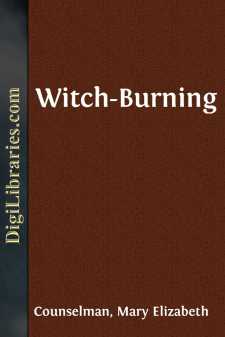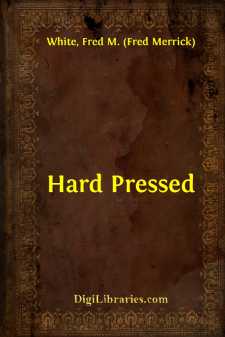Fiction
- Action & Adventure 180
- Biographical 15
- Christian 59
- Classics
- Coming of Age 5
- Contemporary Women 3
- Erotica 8
- Espionage/Intrigue 12
- Fairy Tales, Folklore & Mythology 236
- Family Life 169
- Fantasy 117
- Gay 1
- General 596
- Ghost 32
- Historical 808
- Horror 43
- Humorous 160
- Jewish 25
- Legal 4
- Medical 22
- Mystery & Detective 315
- Political 49
- Psychological 41
- Religious 64
- Romance 159
- Sagas 11
- Science Fiction 730
- Sea Stories 113
- Short Stories (single author) 537
- Sports 10
- Suspense 1
- Technological 8
- Thrillers 2
- Urban Life 31
- Visionary & Metaphysical 1
- War & Military 173
- Westerns 199
Classics Books
Sort by:
They burned a witch in Bingham SquareLast Friday afternoon.The faggot-smoke was blacker thanThe shadows on the moon;The licking flames were strangely greenLike fox-fire on the fen ...And she who cursed the godly folkWill never curse again.They burned a witch in Bingham SquareBefore the village gate.A huswife raised a skinny handTo damn her, tense with hate.A huckster threw a jagged stone—Her pallid...
more...
OCTOBER. FIRST DAY OF SCHOOL. Monday, 17th. To-day is the first day of school. These three months of vacation in the country have passed like a dream. This morning my mother conducted me to the Baretti schoolhouse to have me enter for the third elementary course: I was thinking of the country and went unwillingly. All the streets were swarming with boys: the two book-shops were thronged with fathers...
more...
CHAPTER I IT was a gala night at the National Opera House, and the theatre was crammed from floor to roof, for Melba was sustaining a new part, and all London had gathered to listen. It was rarely indeed that so fashionable an audience assembled in February. The boxes were ablaze with diamonds. On the grand tier, however, there was one box which was not filled with gaily garbed women and which...
more...
WITHOUT DOGMA. ROME, 9 January. Some months ago I met my old friend and school-fellow, Jozef Sniatynski, who for the last few years has occupied a prominent place among our literary men. In a discussion about literature Sniatynski spoke about diaries. He said that a man who leaves memoirs, whether well or badly written, provided they be sincere, renders a service to future psychologists and writers,...
more...
CHAPTER I THE CLUTCHING HAND "Jameson, here's a story I wish you'd follow up," remarked the managing editor of the Star to me one evening after I had turned in an assignment of the late afternoon. He handed me a clipping from the evening edition of the Star and I quickly ran my eye over the headline: "THE CLUTCHING HAND" WINS AGAIN NEW YORK'S MYSTERIOUS MASTER CRIMINAL...
more...
by:
Stephen Crane
STEPHEN CRANE: AN ESTIMATE It hardly profits us to conjecture what Stephen Crane might have written about the World War had he lived. Certainly, he would have been in it, in one capacity or another. No man had a greater talent for war and personal adventure, nor a finer art in describing it. Few writers of recent times could so well describe the poetry of motion as manifested in the surge and flow of...
more...
by:
Clara Bell
THE DUTCH SENSITIVISTS. In the intellectual history of all countries we find the same phenomenon incessantly recurring. New writers, new artists, new composers arise in revolt against what has delighted their grandfathers and satisfied their fathers. These young men, pressed together at first, by external opposition, into a serried phalanx, gradually win their way, become themselves the delight and...
more...
by:
Jennie Hall
THE GREEK SLAVE AND THE LITTLE ROMAN BOY Ariston, the Greek slave, was busily painting. He stood in a little room with three smooth walls. The fourth side was open upon a court. A little fountain splashed there. Above stretched the brilliant sky of Italy. The August sun shone hotly down. It cut sharp shadows of the columns on the cement floor. This was the master's room. The artist was painting...
more...
Chapter II BUY A FARM ON SIGHT I was sitting at a late hour in my room above the college Yard, correcting daily themes. I had sat at a late hour in my room above the college Yard, correcting daily themes, for it seemed an interminable number of years–was it six or seven? I had no great love for it, certainly. Some men who go into teaching, and of course all men who become great teachers, do have a...
more...
PREFACE. There were four of us pilgrims—my Wife, our Boy of ten and a half years, the Doctor, and I. My object in going—the others went for the outing—was to gather "local color" for work in Western history. The Ohio River was an important factor in the development of the West. I wished to know the great waterway intimately in its various phases,—to see with my own eyes what the...
more...











